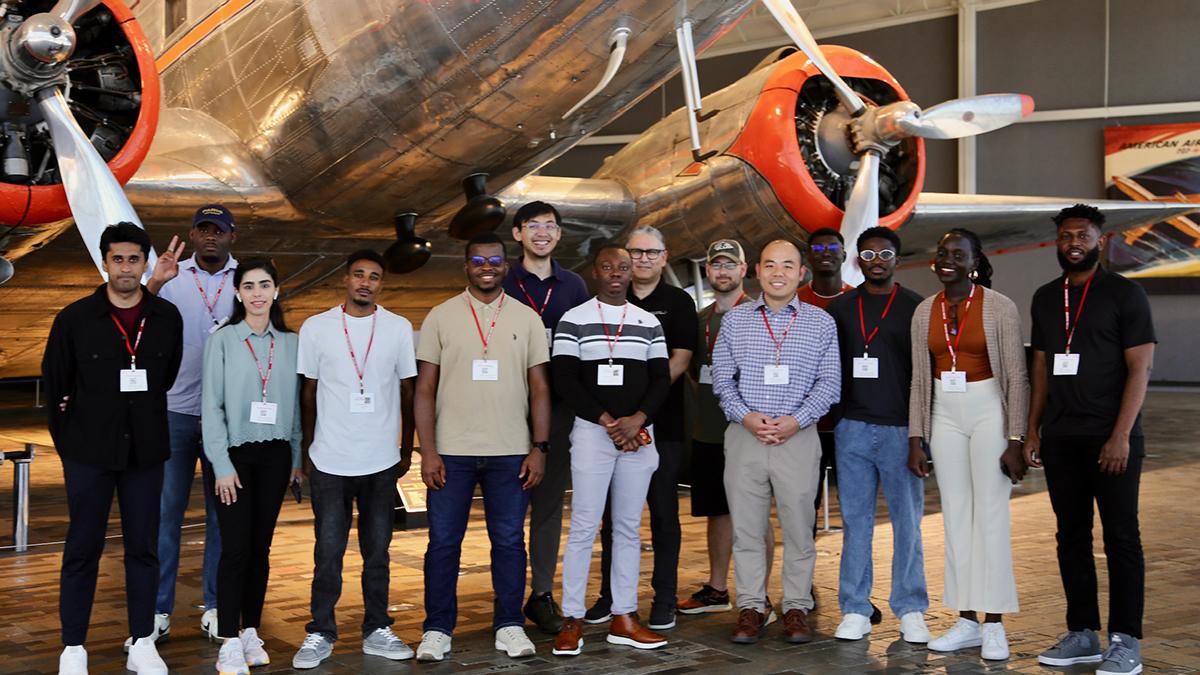
Students and faculty from the FAMU-FSU College of Engineering visit C.R. Smith Museum in Fort Worth, TX. (Photo courtesy Yanshou Sun)
The aviation industry is experiencing unprecedented growth in data-driven decision-making.
According to The Business Research Company, the aviation analytics market is predicted to increase from $3.37 billion in 2024 to $3.82 billion in 2025, reflecting a compound annual growth rate (CAGR) of 13.3%.
At the forefront of this transformation, engineering students from the FAMU-FSU College of Engineering recently demonstrated how machine learning and predictive analytics can solve real-world aviation challenges through the second Aviation Big Data Case Competition.
Sponsored by the National Science Foundation (NSF) and hosted by the FAMU-FSU College of Engineering in collaboration with American Airlines, this year’s competition showcased the transformative power of data analytics in tackling complex operational problems facing the modern aviation industry.
Engineering Innovation Takes Center Stage
The competition brought together some of the brightest minds from industrial, civil, mechanical and computer science disciplines over six intensive weeks. Students dedicated their efforts to developing sophisticated algorithms designed to understand passenger preferences and optimize flight operations.

Armed with anonymized customer booking and search history data provided by American Airlines’ Operations Research & Advanced Analytics Group (OR&AA), these aspiring engineers embarked on developing a cutting-edge destination recommendation system. Their work exemplifies how machine learning and predictive analytics are becoming essential tools for airlines to optimize flight schedules, improve customer experience, and reduce costs, according to the International Air Transport Association.
Students presented their algorithms to a distinguished panel of judges, including joint college faculty members Yanshuo Sun, Arda Vanli, and Raghav Gnanasambandam, alongside industry experts José Ramírez-Hernández and Samuel Rodríguez. The evaluation focused on solution quality, creativity, presentation clarity, and teamwork—all essential skills for successful engineers.
Three standout teams—SkyPredict, Pathfinders, and Katana—advanced to the final round at American Airlines headquarters in Fort Worth, Texas.
From Theory to Real-World Application
At the AA headquarters, students were exposed to how data-driven decision-making shapes modern airline operations. Ramírez-Hernández emphasized the critical importance of analytics in today’s aviation environment, where fuel represents nearly a third of an airline’s operational expenses, according to IATA.
Participants gained valuable insights through presentations by John Fontecha and Samuel Rodríguez, who demonstrated advanced optimization techniques that save airlines millions of dollars through refined aircraft maintenance scheduling and enhanced spare parts inventory management. These real-world applications highlight how predictive maintenance analytics are revolutionizing the industry, according to aviation industry research.
Students toured the Integrated Operation Center (IOC), witnessing controllers manage operational disruptions and make real-time decisions during flights. This experience demonstrated the practical applications of aviation big data analytics in ensuring flight safety and operational efficiency.
Hackathon Challenge: Predictive Analytics in Action
The competition culminated in an intensive eight-hour hackathon where teams developed predictive models for aircraft turn-time at various airports. This challenge is perfectly aligned with current industry trends, as machine learning algorithms are increasingly used to process large volumes of disparate data and create accurate snapshots of individual aircraft components.
This competition directly prepares students for careers in an industry where data scientists and engineers are increasingly in demand.
Teams tackled the complex challenge of combining pandemic-era data with dynamic feature engineering to enhance their models’ predictive accuracy. Equipped with cloud computing resources provided by Snowflake, students channeled their creativity and technical skills in a race against time.
The final presentations to a distinguished panel, including Ananda Datta from OR&AA, showcased how each participant had grown through this unique experiential learning opportunity. Team Katana finished first, followed by SkyPredict in second place and Pathfinders in third.
Building the Future of Aviation Through Data Science Education
The second Aviation Big Data Case Competition reinforced the vital role experiential learning plays in data science education. Participating students not only refined their technical skills but also forged invaluable professional relationships that could shape their career trajectories in the rapidly growing aviation analytics field.
The global big data in flight operations market reached $4.4 billion in 2023 and is estimated to register over 9% CAGR between 2024 and 2032, creating numerous opportunities for today’s engineering graduates, according to Global Market Insights. This competition directly prepares students for careers in an industry where data scientists and engineers are increasingly in demand.
With continued support from the National Science Foundation, the collaboration between the FAMU-FSU College of Engineering and American Airlines is laying a promising foundation for even more ambitious future competitions. Together, they are bridging the gap between academic theory and practical application, preparing the next generation of data-savvy engineers to revolutionize the airline industry.
The competition exemplifies how NSF’s investment in engineering education creates opportunities for students to engage with cutting-edge technologies while addressing real-world challenges. As aviation continues its digital transformation, these experiences ensure our future engineers are ready to lead innovation in data-driven decision making.
Editor’s Note: This article was edited with a custom prompt for Claude 3.7 Sonnet, an AI assistant created by Anthropic. The AI optimized the article for SEO discoverability, improved clarity, structure and readability while preserving the original reporting and factual content. All information and viewpoints remain those of the author and publication. This disclosure is part of our commitment to transparency in our editorial process. Last edited: June 26, 2025.
RELATED ARTICLES
Engineering Doctoral Candidate Receives the American Public Transportation Foundation Scholarship
